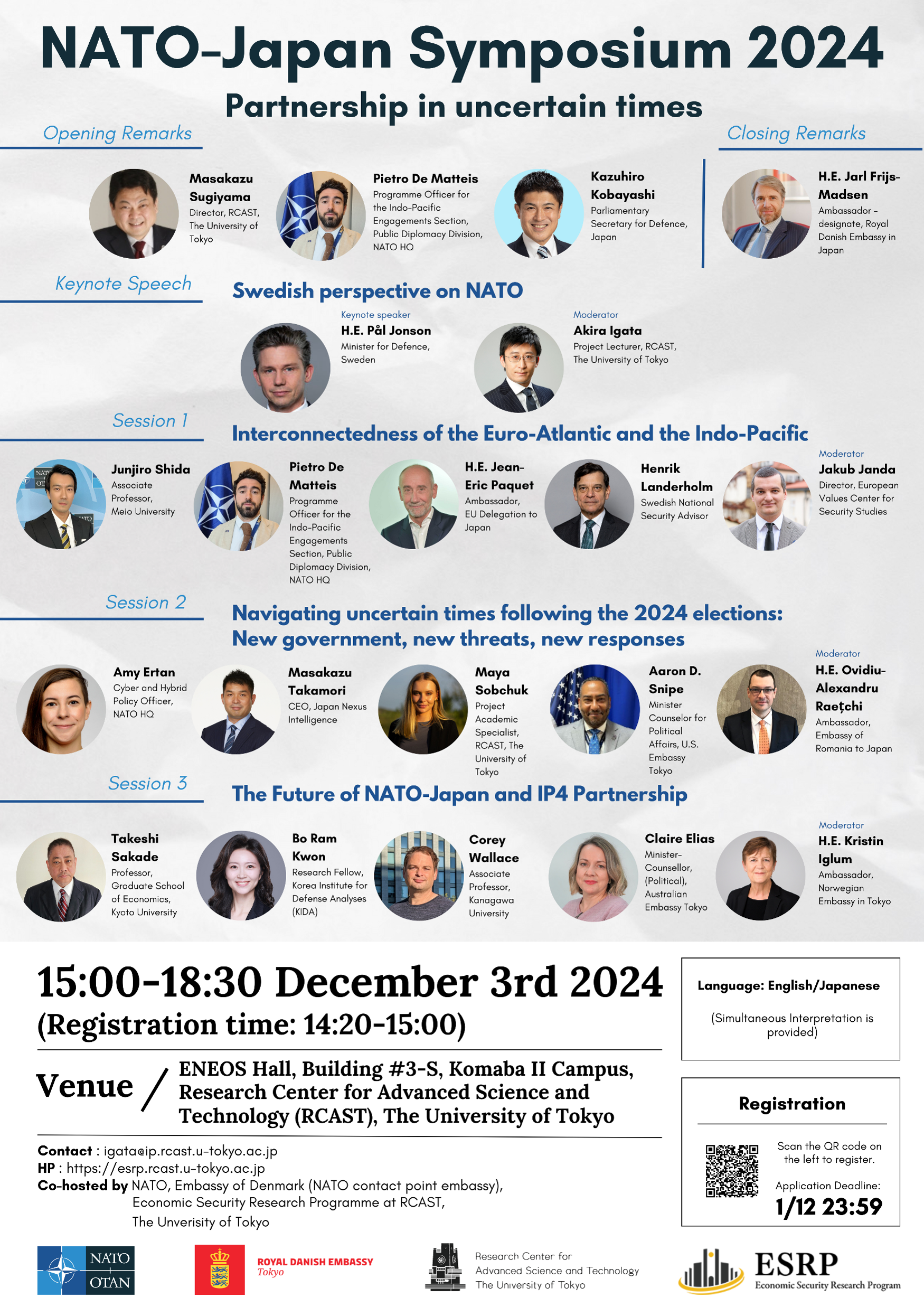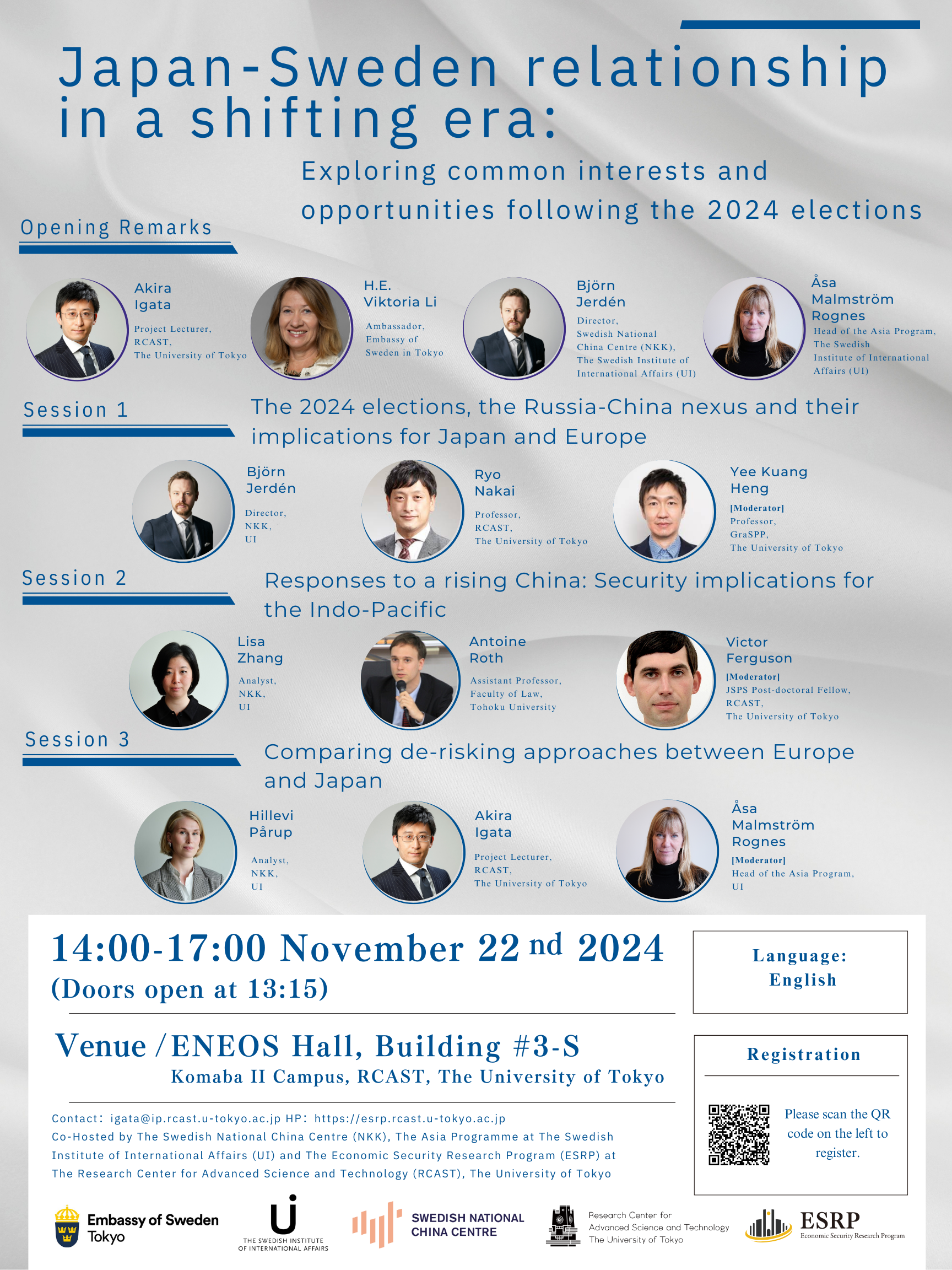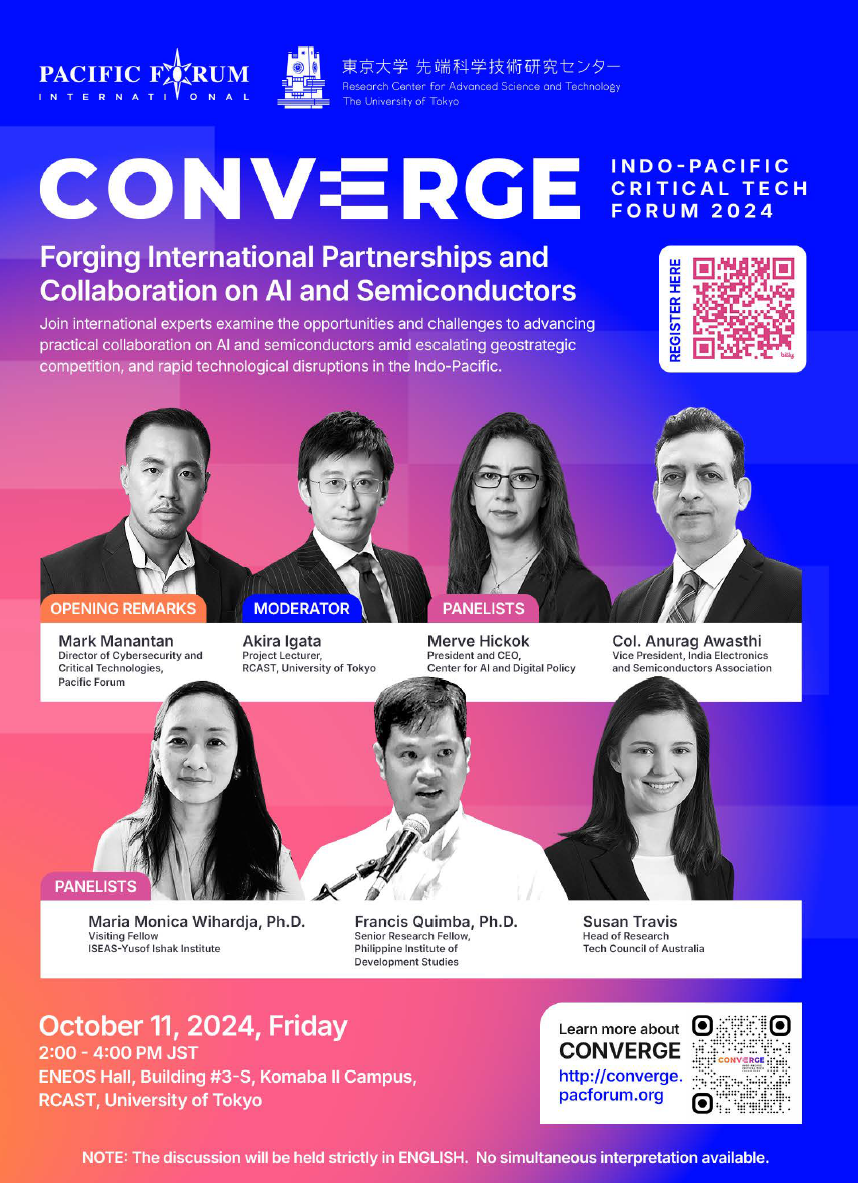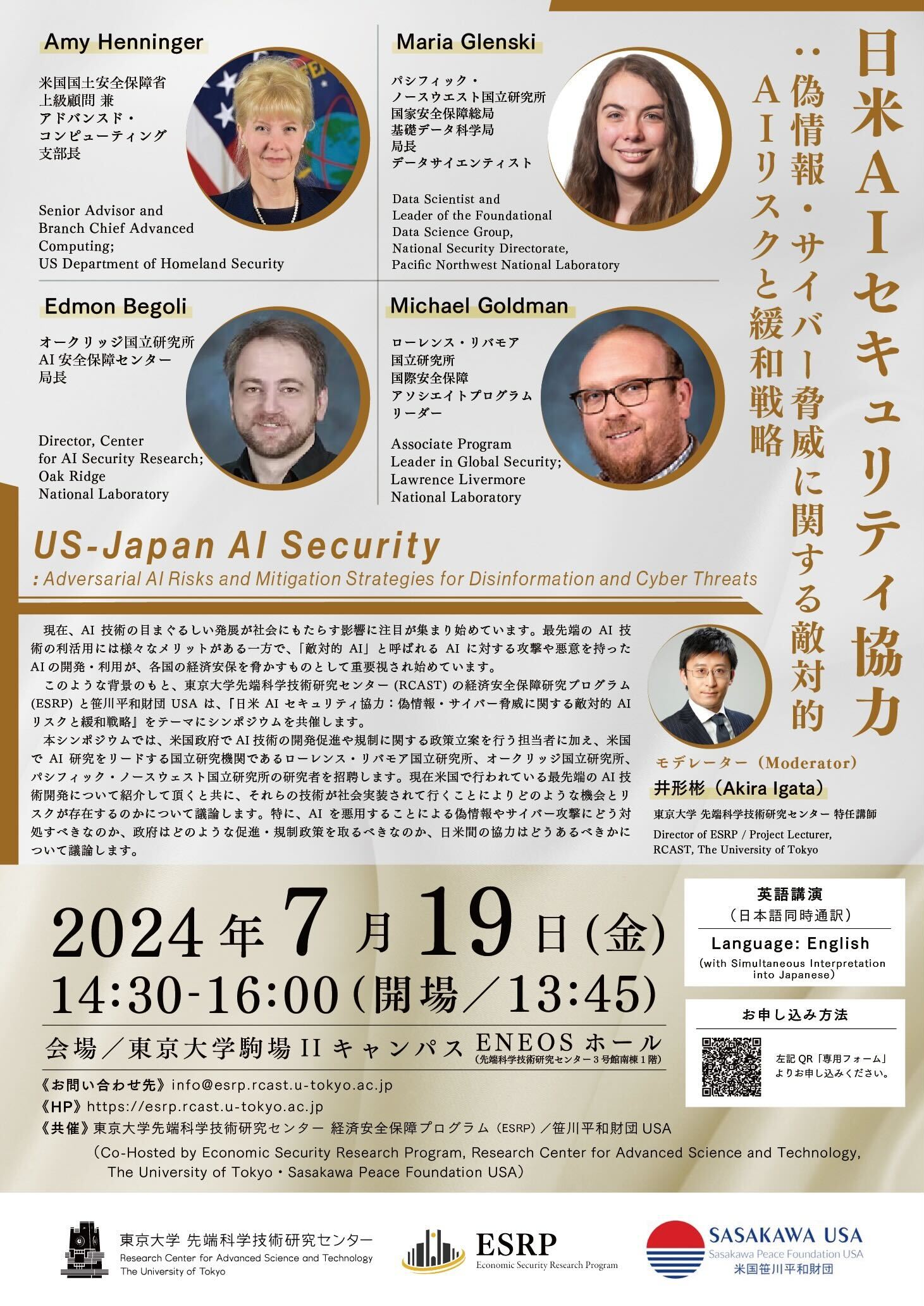Events
July 19: US-Japan AI Security: Adversarial AI Risks and Mitigation Strategies for Disinformation and Cyber Threats
Today, there is growing attention on societal impacts of the rapid development of Artificial Intelligence. While the utilization of cutting-edge AI technology offers various advantages, the development and use of "adversarial AI," or AI with malicious intent or attacks against AI, has emerged as a serious economic security risk for nations around the world.
Against this backdrop, the Economic Security Research Program (ESRP) at RCAST, the University of Tokyo and the Sasakawa Peace Foundation USA will co-host a symposium titled "US-Japan AI Security: Adversarial AI Risks and Mitigation Strategies for Disinformation and Cyber Threats".
The symposium will feature speakers from the U.S. government in charge of developing policies to promote and regulate AI technology development, as well as researchers from Lawrence Livermore National Laboratory (LLNL), Oak Ridge National Laboratory (ORNL), and Pacific Northwest National Laboratory (PNNL), leading national research institutes for AI research in the United States. They will introduce cutting-edge AI technology developments in the U.S. and explore risks and opportunities these technologies will bring to our society. In particular, we will discuss how to deal with AI-enabled disinformation and cyberattacks, ideal promotion and regulatory means for the government, and the future of Japan-US cooperation on AI related issues.
The event report is here.
Overview of the event
| Date | July 19th (Fri.), 2024 14:00-16:30 JST |
|---|---|
| Place | Komaba II Campus ENEOS Hall (RCAST 3rd South Building 1st floor) |
| Capacity | 172 |
| Fee | For Free |
| Speakers | 【Panelists】 ・Amy Henninger (Senior Advisor and Branch Chief Advanced Computing; US Department of Homeland Security) ・Maria Glenski (Data Scientist and Leader of the Foundational Data Science Group, National Security Directorate, Pacific Northwest National Laboratory) ・Edmon Begoli (Director, Center for Al Security Research; Oak Ridge National Laboratory) ・Michael Goldman (Associate Program Leader in Global Security; Lawrence Livermore National Laboratory)【Moderator】 ・Akira Igata: ESRP, RCAST, The University of Tokyo |
| Language | English and Japanese (with simultaneous interpretation) |
| Registration | Registration form |
| Details | Co-hosted by: ESRP, RCAST, The University of Tokyo; Sasakawa Peace Foundation USA Bringing in dangerous materials and eating and drinking in the venue etc. are prohibited. please note that participants will need to follow our instructions on the day. Please make sure to bring your photo ID (e.g., student card, driver’s license, etc.) on the day of the event for us to confirm your identity. For security reasons, we may decline those whose identity we cannot confirm. If an interpretation device is lost or damaged, you may be asked to pay for the damage. Please be sure to return it when you leave. |

Economic Security Research Program (ESRP) at the Research Center for Advanced Science and Technology (RCAST) at The University of Tokyo, along with the NATO HQ and the Royal Danish Embassy Tokyo (NATO Contact Point Embassy), will co-host the "NATO-Japan Symposium 2024: Partnership in Uncertain Times."
Following the "NATO-Japan Symposium 2023: Emerging Security Challenges," we will once again convene experts from around the world to RCAST, The University of Tokyo to discuss how partner countries can collaborate with each other in the era where uncertainty reigns.
This year, we have the privilege of welcoming the Swedish Defense Minister to make a keynote speech. This will be followed by a discussion among NATO HQ experts, numerous Ambassadors (EU, Norway, Denmark, Romania), and Japan's Parliamentary Vice Minister of Defense, among others.
We will focus on 3 topics during the discussions. (1) Interconnectedness of the Euro-Atlantic and the Indo-Pacific; (2) Navigating uncertain times following the 2024 elections; New government, new threats, new responses; and (3) The Future of NATO-Japan and IP4 Partnership.

The Economic Security Research Program (ESRP) at The Research Center for Advanced Science and Technology (RCAST), The University of Tokyo and The Swedish National China Centre (NKK) and The Asia Programme at The Swedish Institute of International Affairs (UI) will co-host a symposium, with a backing from the Embassy of Sweden in Tokyo, titled “Japan-Sweden Relationship in a shifting era: Exploring common interests and opportunities following the 2024 elections.”
This symposium will bring together Swedish and Japanese experts on security and economic issues to discuss: (1) How Sweden and Japan perceives the impact of various elections that have taken place in 2024 and the increasing coordination between China and Russia; (2) How Sweden and Japan are responding to the rise of China; and (3) Comparative approaches towards de-risking between Europe and Japan

The Economic Security Research Program (ESRP) at RCAST, The University of Tokyo and Pacific Forum will co-host a symposium titled "CONVERGE: Forging International Partnerships and Collaboration on AI and Semiconductors" from 14:00-16:00 on Oct.11.
This symposium will bring together experts from 5 countries in the Indo-Pacific - U.S., Australia, India, Singapore, and the Philippines - to discuss how this region can collaborate better on issues related to AI and semiconductors.
We will share some of the outcomes from the closed discussions, where we examined the challenges and opportunities facing different CET actors operating in the Indo-Pacific related to AI and semiconductors. This will allow for the identification of the means to identify best practices for enhancing Indo-Pacific tech cooperation while building trust between existing stakeholders.
The language of this symposium will be in English. Please note that there is NO simultaneous interpretation. Pre-registration required.

Taiwan has become a global powerhouse in cutting-edge semiconductor manufacturing and a driving force in the next generation of AI revolution. However, due to its dynamic economic relationship and tense military relations with China, the high-tech island nation has found itself at the forefront of potential global conflict zones since the escalation of the techno-geopolitical era of comprehensive US-China competition.
As economic security becomes an increasingly important element of national security, Taiwan’s experience offers important insights into how the People’s Republic of China (PRC) has advanced its technological power. At the event, Dr. Jeremy Chih Cheng Chang, a research fellow and Director of Semiconductor Policy at DEST, a new launched public think tank in Taiwan, will explain the evolution of Taiwan's economic security framework, exploring historical perspectives and regulatory insights, and discussed lessons learned for international allies.
Mailing List
The earliest information about the latest event will be delivered.
Please register from the button below.


